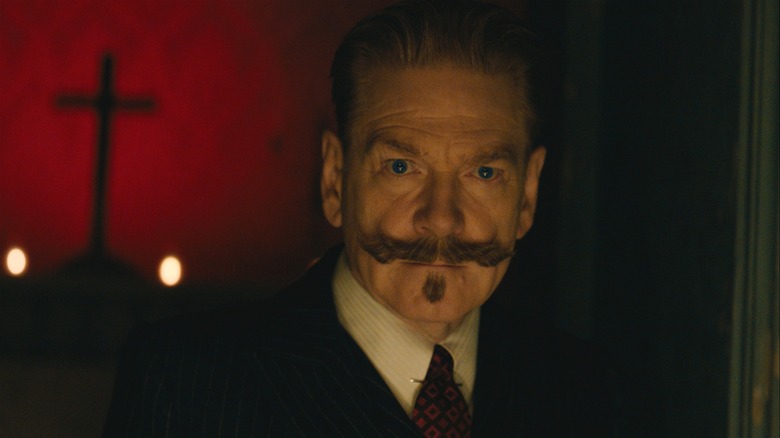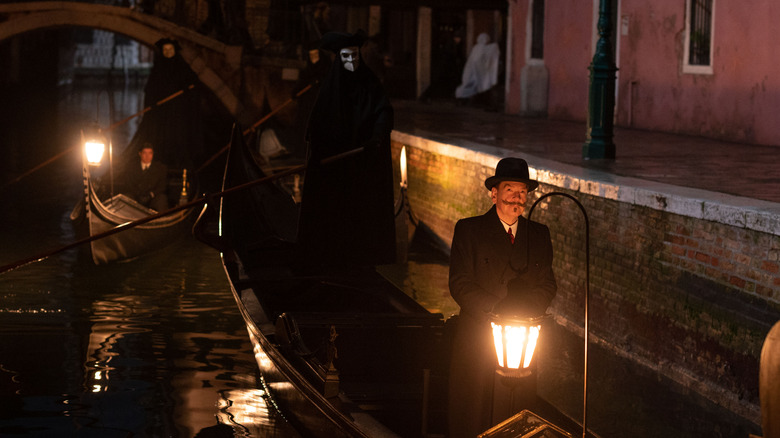A Haunting In Venice Review: Enough Disappointment To Fill The Nile
- Fun supporting performances
- Michelle Yeoh steals the show
- Plays its silly source material too straight
- The supporting characters are all underwritten
There is no blockbuster movie franchise right now that's quite as tonally inconsistent as Kenneth Branagh's adaptations of Agatha Christie's classic Poirot mysteries. His dryly comedic take on the Belgian detective debuted in 2017 via a straightforward retelling of "Murder on the Orient Express" — a modest hit that didn't make the source material fresh so much as attempt to distract from its familiarity via a starry cast of A-listers. For the long-delayed sequel "Death on the Nile," the franchise pivoted from being a straightforward whodunnit into something far more bizarre.
Nearly two years later, and I can't work out if it was a work of knowing-camp that was in on the joke of its sheer ridiculousness, or completely oblivious as to how every performer felt like an alien trying to pass off as human, and each of its oddball sex scenes felt like the result of an AI prompt asking for a "PG-13 Showgirls." It wasn't a good movie, but it was as delightfully deranged as its predecessor was unremarkably ordinary.
At the press screening of "A Haunting in Venice" I attended, I got the sense that many of my fellow critics were priming themselves for a similar so-bad-its-good experience in the hands of director-star Branagh, with the first 15 minutes or so routinely soundtracked by what can only be described as forced laughing. Every mundane incident was greeted with knowing guffaws from viewers who were clearly desperate to seek out a moment that could be as instantly memeable as Gal Gadot's "Enough Champagne to fill the Nile" speech; the sight of Poirot measuring two eggs at a market stall (a mildly amusing depiction of his eccentricities) was treated like the wackiest comedy set piece this side of "Dumb and Dumber." There is nothing in "A Haunting in Venice" anywhere near as memorable as Gadot's bizarre line readings. This is a perfectly functional murder mystery, which aspires to Edgar Allan Poe more than it does Christie — and when placed in comparison with its predecessor, is clearly the better of the two films.
Playing it straight
This is the extent of the faint praise with which I'll damn Kenneth Branagh's movie, which I feel has been given a pass from many critics simply because it's being placed in direct contrast with "Death on the Nile"; this isn't a ridiculous romp in the same light and treats its central mystery with far more seriousness. It functions as a conventional whodunnit and never descends into pantomime, which may satisfy fans of the genre (it's already been hailed as the best of the trilogy) but felt pretty deflating considering just how joyously bonkers the previous film was. This just feels boring placed next to it. By the halfway point, the most unexpected thing of all happened: I found myself longing for Gadot to reappear to liven things up a bit.
This isn't to say that "A Haunting in Venice" is played straight. Instead, its over-the-top aspects are all in its overt nods to the gothic, nodding to the horror literature of the past (direct references to Poe's work), and the horror movies of the present (Branagh has discovered jump scares, and tries to mine as many as he can from this material). We open in 1947 when Poirot has become a semi-recluse, refusing to take on any new cases, until he's greeted by old friend Ariadne Oliver (Tina Fey), an author of detective novels inspired by Poirot's real-life cases who's in desperate need of a hit after three consecutive flops. Considering Branagh's box office track record of late, I'm sure this is a struggle he empathizes with.
Dragged to a Halloween party, Poirot reluctantly agrees to attend a séance, which Ariadne hopes will get his juices flowing again so she can track one of his cases first-hand. Unfortunately, what the medium (played by a game Michelle Yeoh) discovers is underwhelming, with Poirot initially sensing he's at the center of a lazy practical joke — that is, until bodies start to pile up outside, and he hallucinates the recently departed girl they were all trying to contact. Nobody else can see this, so does it mean the house is haunted, or is it the physical manifestation of his PTSD built up over years of dealing with deadly cases? Before we know it, he proudly announces that after a few years away, "Hercule Poirot is on the case!"
Everyone's a suspect — and nobody is fleshed out enough for me to care
As with Kenneth Branagh's prior Poirot films, it's hard to get fully invested in the mystery when the suspects are barely fleshed out. Three films in, and our wacky protagonist — increasingly closer to "The Pink Panther" detective Inspector Clouseau than his traditional characterization — largely remains more of an interconnected set of quirky mannerisms than a fully imagined character, the trauma of his past that should offer us greater insight relegated to flashbacks. Tina Fey is afforded the most backstory as Ariadne, but this is largely because she was a mainstay of the novels, and a not-so-subtle surrogate for Agatha Christie herself, even if the actress has made the choice to play her like a journalist from a fast-talking 1940s screwball comedy. Of the new additions, Yeoh reminds us that prior to her Oscar win, she was synonymous with elevating franchise dreck by treating silly material with utter solemnity; there's no winking to the audience here as she opens a monologue with "I like the term 'medium,' because I am neither big nor small" — a quote that should land screenwriter Michael Green in jail.
None of the characters feel drawn from the same film; more so than the two prior efforts, broader comedy archetypes sit awkwardly when placed next to quiet figures still struggling to process their traumatic pasts. Jamie Dornan, as Dr. Leslie Ferrier, is defined by his lingering PTSD following WWII — attempts to fashion this into a mismatched buddy comedy with his Edgar Allan Poe-obsessed son Leopold (Jude Hill — yes, the kid from "Belfast," playing Dornan's son for a second time!) taking the role of the parental figure. This is the closest the movie gets to genuine sweetness, but the screenplay keeps trying to find jokes within this dynamic in a way that undermines it; a recurring issue for this film, which I felt was holding itself back from fully committing to the comedic moments so it could ensure a greater tonal command than its predecessor. It once again left me wishing it would just become an out-and-out pantomime, instead of taking itself more seriously than this franchise needs.
If you're looking for a straightforward murder mystery, "A Haunting in Venice" sees Branagh play Christie's source material far straighter than before, even if this is his least faithful adaptation to date. Purists may have a greater appreciation for it because of this — I just wish Branagh would let his hair down a bit more and once again deliver something every bit as eccentric as his mustachioed protagonist.
"A Haunting in Venice" premieres in theaters on Friday, September 15.
This piece was written during the 2023 WGA and SAG-AFTRA strikes. Without the labor of the writers and actors currently on strike, the movie being covered here wouldn't exist.


